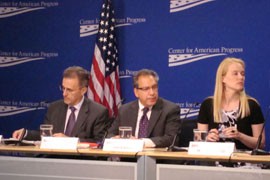Cronkite News has moved to a new home at cronkitenews.azpbs.org. Use this site to search archives from 2011 to May 2015. You can search the new site for current stories.
Arizona colleges among few moving toward ‘competency-based’ learning
WASHINGTON – Rio Salado Community College and Arizona State University were cited Thursday as schools that are taking tentative steps toward “competency-based education,” which recognizes student mastery of subjects rather than the number of hours spent in a classroom.
Supporters of competency-based learning – which focuses on the outcomes of learning and what students need to know in the workplace – argue that it would be more efficient than the current system of credit hours.
“There are more actors recognizing that we need a system that produces more degrees, faster degrees and cheaper degrees – but, most importantly, better degrees and credentials,” said Amy Laitinen, the deputy director for higher education for New America Foundation.
“All of these different efforts are basically recognizing that competency is going to be key to helping us get there,” said Laitinen, at a Center for American Progress meeting on the issue Thursday.
But others worry that the idea, while intriguing, might not apply to all subjects and that shifting from the current system could be a massive and disruptive undertaking.
“It’s not that this is an entirely new phenomenon; there have been many programs that have been competency based in many different sectors,” said Michael Tanner, vice president of the Association of Public and Land-Grant Universities. “The challenge is taking it to a national scale.”
But Laitinen said discussions about competencies are growing within higher education because of concerns about educational quality.
The credit hour has long been the standard for measuring and counting student progress at colleges and universities, but there are inherent problems in measuring learning by “seat time” and credit hours, she said. While the credit hour has helped determine faculty workloads, class schedules and federal student aid, the problem is that it is based around time and not learning.
“If it were really an accurate measure of learning, it would be able to be used like a currency,” Laitinen said. “But everyone knows that as students who are trying to transfer from one institution to another, a credit hour isn’t a credit hour. It’s fundamentally divorced from learning.”
Rio Salado is trying to recognize the experiences and courses students bring to them to the college, even those experiences in a non-traditional academic setting, said spokeswoman Delynn Bodine.
“Receiving credit for prior learning reduces the costs to complete a degree, it impacts time to completion and it gives students a boost when they are entering college,” she said.
That type of innovation needs to be fostered to raise productivity, but it also needs to be done in an environment that maintains quality, said Eduardo Ochoa, assistant secretary for postsecondary education at the U.S. Department of Education.
Competency-based education is one potentially important step in that direction, he said.
“One of the things we clearly need is an expanded capacity in our education system, but we also need to maintain quality,” Ochoa said. “We need to find ways to reduce time to degree and to innovate the core learning and teaching activities.”
With its focus on interdisciplinary learning, Arizona State University has been successful in preparing students for the social aspects of learning as well as giving them a broad knowledge base, said Ralph Wolff, president of the Western Association of Schools and Colleges.
ASU President “Michael Crow and ASU are trying to develop new approaches to expand its competency,” Wolff said Thursday.
But Wolff said there is not a one-size-fits-all solution, noting that competency-based education may not be applicable to every field.
Tanner said advocates of any change will have their work cut out for them.
“If you think about the richness and diversity of American higher education that has existed to this point, I suspect there will be a lot of contention around the definition of a competency before this is going to be smooth sailing,” Tanner said.







